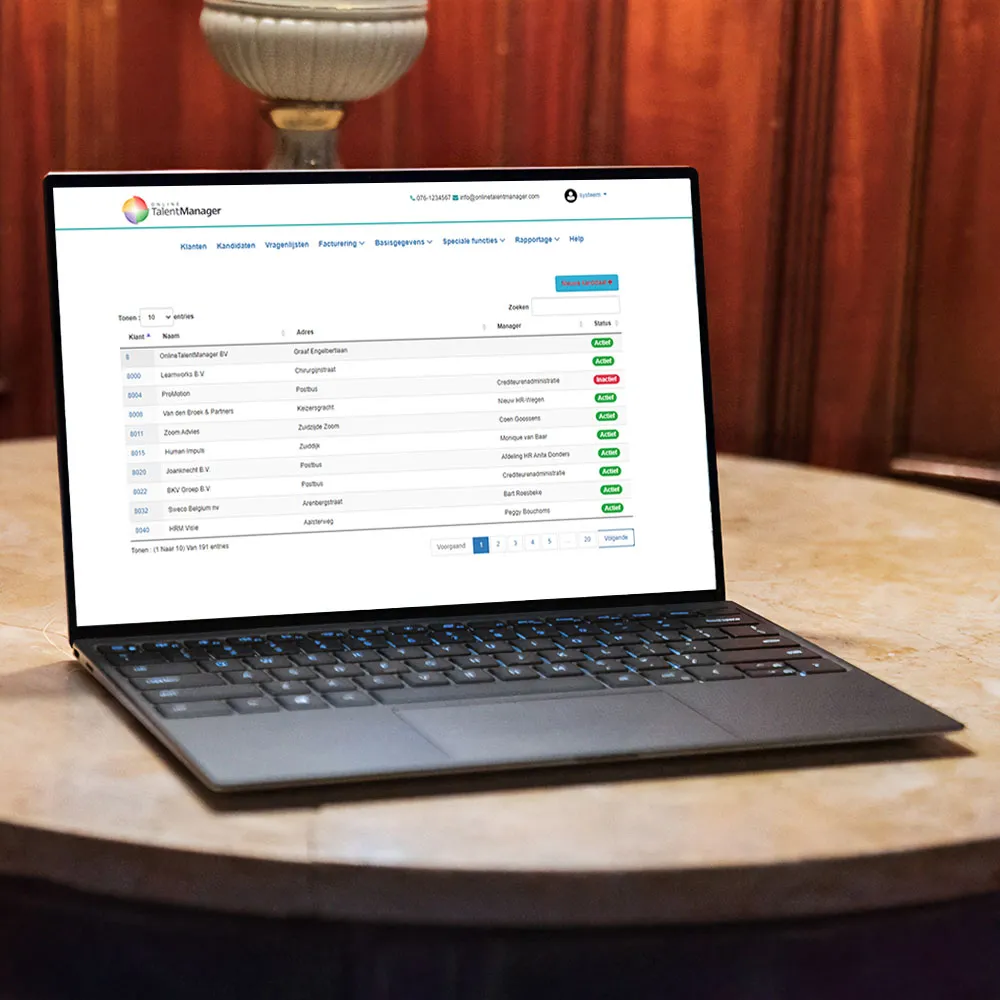




- Built for
- Technology
Laravel | MySQL | Bootstrap | JavaScript
- Industry
Party Booking
- Country
India
Introduction
The Online Talent Manager is a highly complex web-based platform developed using the Laravel framework and a MySQL database. Its primary purpose is to revolutionize talent management by offering a comprehensive system for managing clients, client managers, and candidates. The system facilitates skill development through candidate testing, result analysis, and personalized recommendations for improvement.
Problem Identification
Traditional talent management processes often suffer from inefficiencies and lack of standardization. Manual tracking and evaluation make it difficult to assess candidate progress accurately and identify skill gaps. The absence of a centralized system adds further challenges, such as inconsistent data and limited access to relevant information. The Online Talent Manager aims to address these issues by automating and streamlining talent management processes.
Objectives and Target Users
The Online Talent Manager project has the following objectives:
- Streamline Talent Management: Simplify talent management processes and reduce manual efforts involved in candidate tracking, assessment, and skill development.
- Enhance Efficiency: Provide a centralized platform for system users, client managers, and candidates to collaborate, access information, and monitor progress.
- Improve Skill Development: Enable candidates to assess their skills through tests, receive feedback, and access personalized recommendations for improvement.
The target users of the system are as follows:
- System Users: Administrators responsible for system maintenance, user management, and overseeing the overall operation of the Online Talent Manager.
- Client Managers: Authorized individuals who manage the talent acquisition process for clients. They have the ability to add, manage, and monitor candidates within the system.
- Candidates: Individuals seeking skill development opportunities. They take tests to evaluate their abilities and receive guidance for skill enhancement.
Features and Functionalities
The Online Talent Manager encompasses various features and functionalities to fulfill its objectives:
- User Management: System users have the authority to add, edit, and remove client managers. Client managers, in turn, can add, edit, and remove candidates as needed.
- Impersonation: System users can log in as client managers, and client managers can log in as candidates using impersonation. This feature allows for effective administration and monitoring of candidate activities.
- Test Module: The system provides a wide range of tests tailored to candidates' skills. These tests assess candidates' proficiency in specific areas and form the basis for skill development recommendations.
- Test Evaluation and Reporting: The platform automatically evaluates test results and generates comprehensive reports. These reports highlight areas of improvement, strengths, and areas where further development is required.
- Skill Development Recommendations: Based on test results, the system suggests specific areas for candidates to focus on to improve their skills. These recommendations provide personalized guidance for skill enhancement.
- Progress Tracking: The system tracks candidate progress, including test scores, skill development activities, and overall performance. This feature enables continuous monitoring and evaluation.
- Collaboration and Communication: The platform facilitates communication between system users, client managers, and candidates. It includes features such as messaging, notifications, and document sharing to foster efficient collaboration.
Development and Testing
The development of the Online Talent Manager involved several stages, including requirements gathering, system design, coding, testing, and deployment. The Laravel framework was chosen for its robust features, scalability, and modular architecture. The development team followed best practices and industry standards to ensure a high-quality product. The system underwent rigorous testing, including unit testing, integration testing, and user acceptance testing, to ensure functionality, usability, and security.
Challenges and Solutions
- Complex User Hierarchy: Implementing a user hierarchy with different roles and permissions required careful planning and design. A flexible and scalable user management system was developed to handle various access levels and impersonation functionality effectively.
- Test Design and Evaluation: Designing appropriate tests for diverse skill sets and automating their evaluation posed a challenge. Extensive research, collaboration with subject matter experts, and continuous iteration were undertaken to create effective test modules and accurate scoring mechanisms.
- Data Security and Privacy: Safeguarding candidate data and ensuring compliance with data protection regulations were critical considerations. Stringent security measures, including encryption, secure authentication, and access controls, were implemented to protect sensitive information.
Results and Outcomes
The implementation of the Online Talent Manager yielded significant improvements in talent management processes. Key outcomes and benefits include:
- Streamlined Talent Acquisition: The system eliminated manual processes and reduced administrative overhead, leading to increased efficiency in managing candidates and their skill development.
- Objective Skill Assessment: The automated evaluation of test results provided an objective measure of candidates' skills, enabling fair and consistent evaluations.
- Personalized Skill Development: Candidates received tailored recommendations for skill improvement, allowing them to focus on specific areas of weakness and make targeted progress.
- Enhanced Reporting and Insights: The comprehensive reporting feature offered valuable insights into overall performance, skill development trends, and areas where additional support was required.
- Improved Collaboration and Communication: The platform fostered effective communication and collaboration among system users, client managers, and candidates, enabling seamless coordination and efficient talent management processes.
Impact Measurement and Recommendations
To measure the impact of the Online Talent Manager, several key metrics can be considered:
- Increased Candidate Engagement: Tracking the number of candidates actively participating in skill development activities within the system can indicate increased engagement.
- Improved Test Scores: Comparing candidates' initial test scores with their subsequent scores can indicate the effectiveness of the skill development recommendations provided by the system.
- Time Savings: Evaluating the time saved in talent management processes, such as candidate onboarding and assessment, can demonstrate increased efficiency.
- Feedback and Satisfaction: Gathering feedback from system users, client managers, and candidates through surveys or interviews can provide valuable insights for further improvements.
Recommendations for future iterations of the Online Talent Manager may include:
- Integration of Machine Learning: Explore the incorporation of machine learning algorithms to improve the accuracy of skill assessments and provide more precise skill development recommendations.
- Expansion of Functionalities: Consider incorporating additional features such as performance tracking, learning resources, and talent analytics to further enhance the talent management experience.
- Mobile Accessibility: Develop mobile applications or optimize the system for mobile devices to provide convenient access for users on the go.
- Integration with Third-Party Systems: Explore integrating the Online Talent Manager with other HR systems, such as applicant tracking systems or learning management systems, for seamless data flow and enhanced functionality.
Client
Online Talent ManagerCategory
Booking WebsiteDate
February 28, 2022Share
Conclusion
The Online Talent Manager successfully tackled the complexities of talent management by providing a comprehensive platform for system users, client managers, and candidates. It streamlined talent acquisition processes, provided objective skill assessments, and facilitated personalized skill development. With its robust functionalities and comprehensive reporting, the system contributed to improving overall talent management efficiency and effectiveness. The Online Talent Manager serves as a vital tool for organizations seeking to optimize their talent acquisition and development strategies.